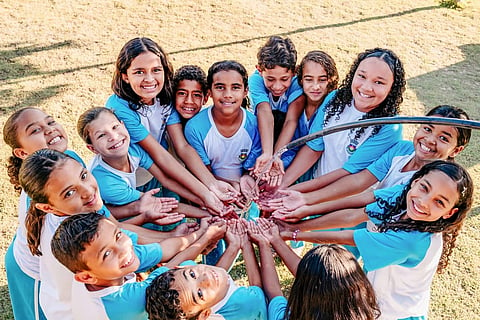
- Home
- EventsEvents
- Product Launches
- CategoriesCategories
- Advertise
- Opinion

During World Water Week 2024, Global Water Challenge (GWC) and Cargill announced the expansion of their Cargill Currents partnership platform with a renewed investment of over $5MM USD over three years and new plans to tackle water-related challenges in communities and basins across five continents: Africa, Asia, Europe, North America and South America. Cargill Currents supports community health and livelihoods, promotes watershed health and advances water security around the world.
In its second phase, the partnership platform will build upon these achievements and continue to focus on prioritizing solutions that deliver multiple benefits, including increasing access to water, sanitation and hygiene (WASH), building climate change resilience, improving farmer livelihoods and empowering women, while also supporting watershed health and sustainable agriculture initiatives in water-stressed regions.
Cargill Currents uses a context-based approach designed to address the specific water needs of each region, including water access, availability and quality issues within priority communities or basins. This work supports Cargill’s ambition of enabling a water-positive impact across its operations, supply chains, and communities by 2030, with an emphasis on improving access to safe drinking water in priority communities around the world.
Since Cargill Currents launched in 2021, the partnership platform has positively impacted more than 135,000 people with improved WASH access across 68 communities in Brazil, Cameroon, Ghana and Ivory Coast. Cargill Currents has built a solid foundation and is on track to benefit over 150,000 people by the end of 2024, significantly contributing to Cargill’s goal of facilitating access to safe drinking water and sanitation for 500,000 people by 2030.
Here is a look at some of the positive impact Cargill Currents is having around the globe:
Brazil: South America
Supported by local partners ChildFund, IPESA, Parceiros Voluntários and World Vision, the Cargill Currents partnership in Brazil is constructing water supply systems and sanitation facilities, significantly improving drinking water access for Brazilian communities across eight municipalities and watersheds.
By the end of 2024, more than 50,000 people will be positively impacted through Cargill Currents in Brazil.
Bulgaria: Europe
In Bulgaria, supported by the Bulgarian Biodiversity Foundation (BBF), the partnership platform is focused on climate change resiliency and addressing water scarcity challenges in the rural areas of Sofia and Varna.
Across six communities, the work includes restoration of public water fountains (known locally as “chesmas”) and two micro wetlands, as well as community engagement to raise public awareness around climate change and the importance of “chesmas” and micro wetlands.
An estimated 25,000 people are expected to benefit from improved water access and climate change resilience.
Cameroon, Cote d’Ivoire, Ghana: West Africa
In West Africa cocoa-growing regions, with local teams from CARE, Habitat for Humanity, She’s Stem Foundation, World Vision and Water and Sanitation for the Urban Poor, activities have focused on the construction of water supply systems and sanitation facilities in schools and communities, as well as training in financial literacy and entrepreneurship, particularly for female farmers.
To date, over 95,000 people have been positively impacted through WASH and other activities, and more than 33,000 women have been empowered through time savings, skills building and income generation activities. New Cargill Currents activities currently underway in West Africa will benefit approximately 30,000 people and up to 12,000 women by 2025.
India: Asia
With local partner Anarde Foundation, Cargill Currents is increasing groundwater and surface water storage capacity with the help of recharge shafts, recharge trenches and desilting of existing water bodies, improving water security across three water-scarce villages.
Cargill Currents has also established Self Help Groups (SHGs). Thus far, 450 women from the Gujarat community have benefited from training in skills development, leading to increased income and improved food security, with additional resources supplemented by up to 20 hectares of sustainably managed agricultural land and gardens.
United States: North America
In the U.S., Cargill Currents has partnered with community-based non-profit organizations across California, Kansas, North Carolina, Ohio, North Dakota and Texas. The partnerships in these states focus on restoration and conservation, including providing guidance on best practices in water stewardship, improving watershed health and mitigating water systems pollution.
Cargill Currents North America has positively impacted over 120 communities and committed more than 2,700 hectares to regenerative agriculture practices. Additionally, in North America the partnership platform activities are helping to improve water security across six watersheds, with the potential to return up to 163MM liters of water per year to communities and nature.
“As water challenges around the world increase, we are making a positive impact through our catalytic partnership with Cargill. Addressing the complex nature of varying water issues in different regions requires specifically tailored and localized responses,” said Monica Ellis, Global Water Challenge CEO. “This World Water Week and beyond, we celebrate Cargill Currents and its continued commitment to providing sustainable solutions that contribute to the safety and resilience of water scarce communities.”
“At Cargill, we believe in the power of partnerships to drive meaningful and scalable impact. Through our collaboration with Global Water Challenge, we are expanding our reach to address critical water challenges around the world,” said Pilar Cruz, Cargill’s chief sustainability officer. “Together, we are building resilient and sustainable ecosystems for the future.”
Building on this solid foundation, the expansion plans of the partnership platform, managed by GWC, are designed to build community resilience, increase water security, promote economic development and deliver multiple socio-economic and sustainability co-benefits in addition to improving water access.
Click HERE to subscribe to our FREE Weekly Newsletter
